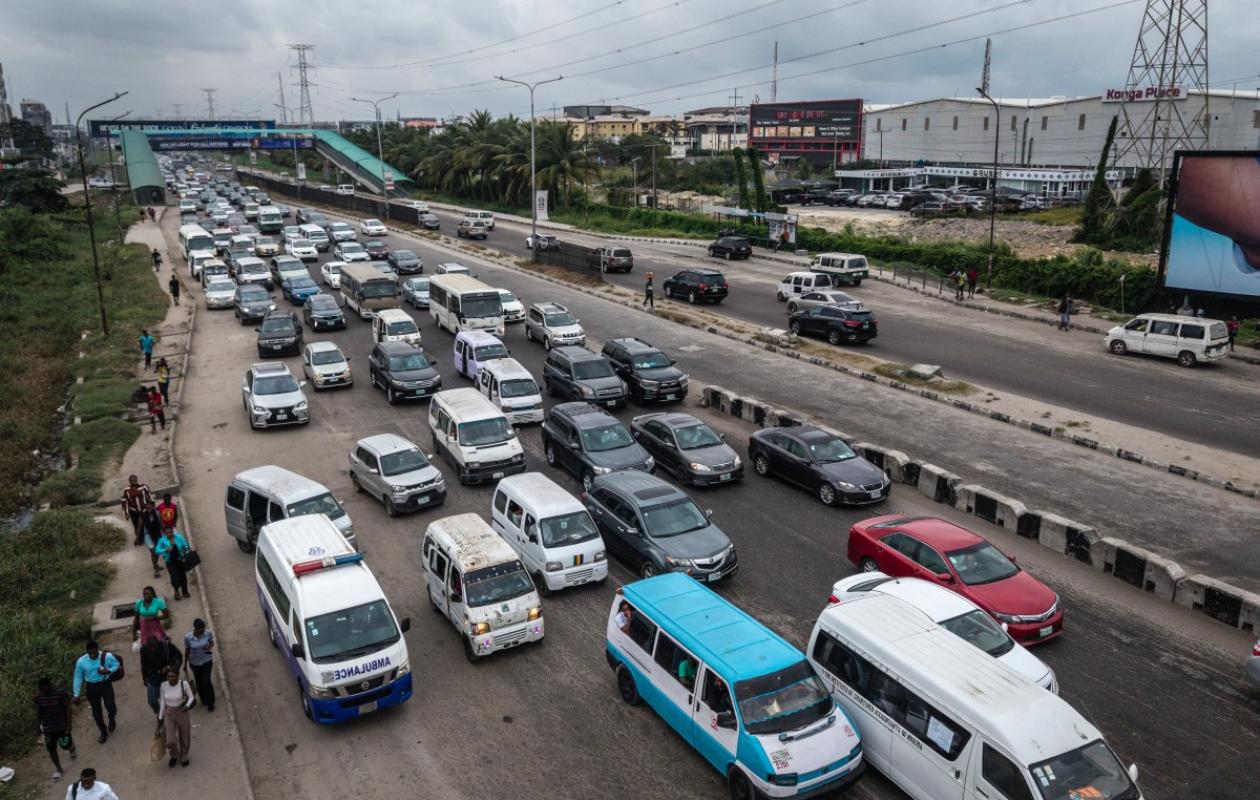
A Lagos, mourir par manque d'ambulances et excès d'embouteillages
With a population of over 20 million, a hundred ambulances are needed: in Lagos, it's not uncommon to die before help arrives or to be stuck in the monstrous traffic jams that paralyze Nigeria's economic capital.
Michelin Hunsa's mother survived, but found unconscious by her neighbors, she initially waited more than two hours for an ambulance, and upon arrival, the doctor diagnosed "a cerebral hemorrhage."
"It's a serious problem, we've waited far too long," laments the distraught 25-year-old woman outside a public hospital.
Unlike public figures escorted by private security cars or police who clear the way for them, paramedics have only themselves to rely on.
Lagos has virtually no dedicated lanes for emergency vehicles, and despite their sirens, shortcuts, walkie-talkies linked to megaphones, and aggressive driving, they struggle to make their way through.
"Most people don't want to give way, which affects our response time," says Opeyemi Queen Soetan, 33, who has been a paramedic for nine years.
"When you're stuck in traffic and the patient's condition deteriorates, it's frustrating. Really frustrating," she continues.
Some drivers, like Anthony Folayinka, believe that ambulances use their sirens for no reason.
"I'm sure most of the time they don't transport real emergencies, which is why I don't move," explains the 38-year-old VTC driver.
Behind the wheel, paramedic Saheed Ayandeji, 42, says the hardest part is "rush hours," usually between 6:00 and 8:00 in the morning and between 4:00 and 6:00 in the afternoon.
Lagos State provides "35 public ambulances," Olusegun Ogboye, permanent secretary of the megalopolis's health ministry, told AFP, in addition to "80 to 90 ambulances" belonging to private companies.
That's a ratio of one ambulance per 200,000 inhabitants.
Since its creation in 2021, Eight Médical has ensured the continuous operation of 34 ambulances, day and night.
"The name refers to the ideal time of 8 to 10 minutes recommended by experts for responding to emergencies. In Lagos, we are still far from that, but that's the goal my team and I are aiming for," explains Ibukun Tunde Oni, 36, founder of this start-up and a general practitioner by training.
Two of his uncles died a few years ago, one of a heart attack during the Christmas holidays, and the other of an asthma attack in an ambulance.
Marked by these two events, he was also the victim of a road accident and waited for the ambulance for three hours on the road.
No data is available on the number of patients who have died due to the chaotic traffic in Lagos. But there are "a lot because 100 ambulances for Lagos is not enough," Oni said.
The strong population growth of the megacity makes the situation even more critical.
Lagos will have a population of 88 million by 2100, making it the most populous city in the world, according to a study by the Global Cities Institute in Toronto.
In addition to the lack of vehicles, emergency medical services must also contend with poor road conditions and a shortage of medical personnel, exacerbated by the economic crisis and poor working conditions.
Poor coordination between hospitals and ambulance services also makes it difficult to know in real time which beds are available for hospitalization.
In 2022, Lagos authorities launched an ambulance boat and a floating clinic, making it possible to serve "15 of the 20 local authorities via the waterways" of the lagoon, and avoid traffic jams, according to Ibrahim Famuyiwa, head of operations for the state waterways authority.
But due to a lack of funds to develop this alternative, the priority of local authorities for the moment is to increase the number of ambulance trucks, particularly through public-private partnerships.
Commentaires (3)
Participer à la Discussion
Règles de la communauté :
💡 Astuce : Utilisez des emojis depuis votre téléphone ou le module emoji ci-dessous. Cliquez sur GIF pour ajouter un GIF animé. Collez un lien X/Twitter ou TikTok pour l'afficher automatiquement.